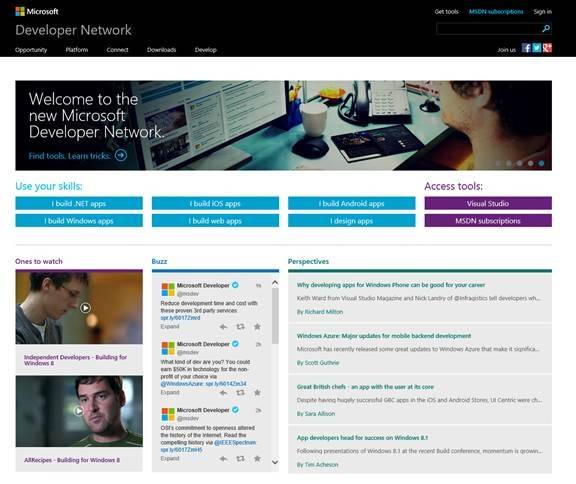
Microsoft recently revamped its Microsoft Developer Network (MSDN) site to give its developer community a more consistent cross-platform experience. Unfortunately, in an attempt to give developers a “more modern place to go as a central landing page to find out everything you want to know about developing for Microsoft,” the company may have inadvertently created a marketing-oriented site for Windows Store that developers hate.
Giving Newbies A Better Place To Start
Brian Harry, a Microsoft Technical Fellow working as the Product Unit Manager for Team Foundation Server, announced the changes in late July. According to Harry, while as much as 70% of visitors to MSDN discover its content through search, others rely on the home page to steer them toward relevant content.

As he explains it, that home page “atrophied” over the years and has “become mostly a routing layer for the variety of platform dev centers around the company,” making it difficult for newbies to find the right content. The new MSDN, then, is designed to provide “a single point of entry for all developers,” be they iOS developers or loyal Windows developers.
Two weeks into the changes, Microsoft’s developer community doesn’t seem to like the “new and improved” MSDN very much.
More Changes, Less Good
Almost immediately, developers started to rail against the changes in the comments section to Harry’s blog post. While the criticism varies wildly, two primary complaints stand out:
- Microsoft has essentially turned a developer site into a marketing brochure
- The new MSDN tries to force developers into working with Windows Store, an option many don’t seem to want to take.
Among those ripping into Microsoft for turning MSDN into a marketing infomercial, here are just a few among many:
The redesign is good, but I’m sorry the content is terrible. This is not a marketing site, it’s a *developer* site. You guys have marketing sites for this stuff already, it needs to be left off of here. You should be showcasing developer content, not sales pitches and marketing team platitudes.
[T]he site is now almost completely useless. You’ve done nothing but place an unnecessary roadblock, the Metro style interface, between developers and the information they come to the site to find. Metro is for consumers, not developers. We don’t need, nor usually want, fluff…
If you are assuming that the majority of people visiting the site are newbie, non-MS tech developers I guess you hit your target….MS is making it more and more difficult for people like me, who have been using and developing for MS platforms for almost 20 years, to keep supporting you guys when you continually make decisions based on what your PR people are telling you are good things.
Directly related to this marketing critique is the suggestion that Microsoft’s new MSDN is actually designed to push people to write Windows Store apps. At least as measured by the comments to Harry’s blog, this isn’t an option many Microsoft developers actually want. Among the criticisms, one from Denny is particularly apt:
[S]o it looks like all the stuff on windows / pc / .net leads to what amounts to advertising for the new app store and windows 8. not very helpful if you are still developing for windows CE and Server 2003-2008 and all the other “old” stuff.
Microsoft Responds
The criticism, some of it “brutal” by Harry’s admission, didn’t fall on deaf ears. In reply, Harry took the lead on answering the most concentrated critiques.
To those furious that MSDN seems to have become a sleight of hand for moving people to Windows Store, rather than technical content, Harry responds that “Yep. We messed that up.” However, his answer essentially sidesteps the core of the question, and instead promises more technical content, and not less of a skew toward breeding Windows Store devotees.
And what about those complaining that MSDN had become a marketing site? According to Harry, much of that was intentional: “Certainly adding a little bit of marketing feel in the sense of representing the “why” [developer with Microsoft technologies] component was intentional.” As he goes on to note, however, developers that “already know ‘why’…don’t [need it] shove[d] it in [their] face and instead [want to] get to the ‘how’ content as quickly and easily as possible.”
He then promises further refinements.
Catering To A Very Demanding Audience
It’s hard to read the comments to Harry’s post without feeling empathy. Microsoft has long been a favorite with developers (they even have a CEO who dances and sings to developers), but in the past few years the company has fallen behind in mobile and web, zigging on proprietary approaches while developers have zagged with open source.
The new MSDN appears to fall short with existing Microsoft developers, and may also be too light to appeal to new developers that want code, not marketing fluff. Fortunately for Microsoft, it has a built-in fan base that wants it to succeed. Unfortunately for the company, however, its new MSDN appears to have disregarded these very developers upon which it must rely.

















